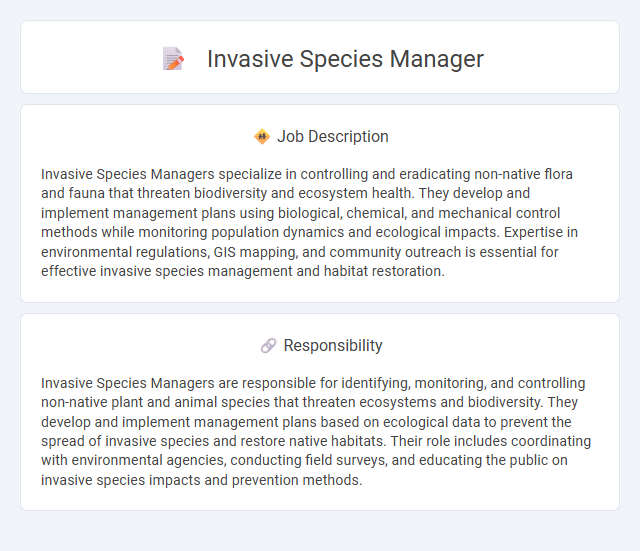
Invasive Species Managers specialize in controlling and eradicating non-native flora and fauna that threaten biodiversity and ecosystem health. They develop and implement management plans using biological, chemical, and mechanical control methods while monitoring population dynamics and ecological impacts. Expertise in environmental regulations, GIS mapping, and community outreach is essential for effective invasive species management and habitat restoration.
Individuals with a strong interest in ecology and environmental conservation are likely well-suited for an Invasive Species Manager position. Candidates who handle stressful field conditions and complex problem-solving tasks effectively might find this role compatible with their skills and personality. Physical fitness and adaptability could increase the probability of success given the often rugged outdoor work environments and variable schedules.
Qualification
Invasive Species Manager roles require expertise in ecology, environmental science, or natural resource management, often supported by a bachelor's or master's degree. Candidates must possess proficiency in species identification, data analysis, and control methods, as well as experience with Geographic Information Systems (GIS) and environmental regulations. Strong skills in project management, communication, and collaboration with government agencies and stakeholders are essential for effective invasive species prevention and remediation.
Responsibility
Invasive Species Managers are responsible for identifying, monitoring, and controlling non-native plant and animal species that threaten ecosystems and biodiversity. They develop and implement management plans based on ecological data to prevent the spread of invasive species and restore native habitats. Their role includes coordinating with environmental agencies, conducting field surveys, and educating the public on invasive species impacts and prevention methods.
Benefit
An Invasive Species Manager likely contributes significantly to protecting native ecosystems by controlling or eradicating harmful non-native species, which may reduce biodiversity loss and economic damage. This role probably enhances public awareness and collaboration among stakeholders, promoting sustainable environmental practices. Effective management by this professional could improve habitat quality, supporting wildlife conservation and potentially boosting local economies through healthier ecosystems.
Challenge
The Invasive Species Manager likely faces the challenge of balancing ecological preservation with resource limitations, requiring innovative strategies to control invasive populations effectively. They probably encounter difficulties in predicting the spread and impact of invasive species due to environmental variability and incomplete data. Coordinating efforts among stakeholders and ensuring compliance with regulations might also present ongoing complexities in their role.
Career Advancement
An Invasive Species Manager oversees the control and prevention of non-native species that threaten ecosystems and biodiversity, requiring expertise in environmental science and project management. Career advancement opportunities include roles such as Environmental Program Director, Conservation Manager, or Policy Advisor within governmental agencies and private environmental firms. Gaining certifications in ecological management and expanding skills in GIS technology enhances prospects for leadership positions and higher salary brackets.
 kuljobs.com
kuljobs.com